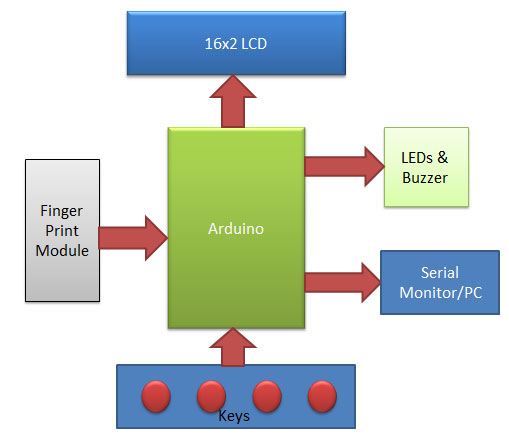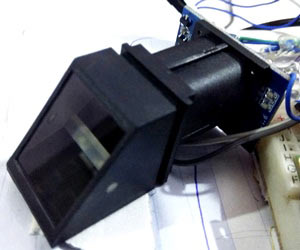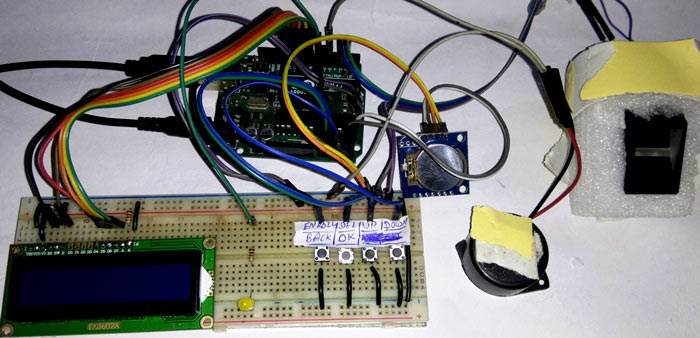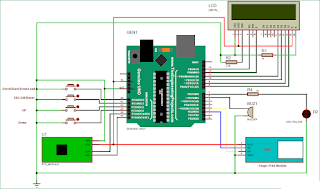Required Components
- Arduino -1
- Finger print module -1
- Push Button - 4
- LEDs -1
- 1K Resistor -2
- 2.2K resistor -1
- Power
- Connecting wires
- Box
- Buzzer -1
- 16x2 LCD -1
- Bread Board -1
- RTC Module -1
Project Description:
In this fingerprint attendance system circuit, we used Fingerprint Sensor module to authenticate a true person or employee by taking their finger input in the system. Here we are using 4 push buttons to enroll, Delete, UP/Down. ENROLL and DEL key has triple features. ENROLL key is used for enrollment of a new person into the system. So when the user wants to enroll new finger then he/she need to press ENROLL key then LCD asks for the ID, where user want to be store the finger print image. Now if at this time user does not want to proceed further then he/she can press ENROLL key again to go back. This time ENROLL key behave as Back key, i.e. ENROLL key has both enrollment and back function. Besides enroll key is also used to download attendance data over serial monitor. Similarly, DEL/OK key also has the same double function like when user enrolls new finger, then he/she need to select finger ID by using another two key namely UP and DOWN. Now user need to press DEL/OK key (this time this key behave like OK) to proceed with selected ID. And Del key is used for reset or delete data from EEPROM of Arduino.

FingerPrint module:

Fingerprint sensor module captures finger’s print image and then converts it into the equivalent template and saves them into its memory as per selected ID by Arduino. All the process is commanded by Arduino like taking an image of finger’s print, convert it into templates and storing as ID etc.
Here we have added a Yellow LED which indicates that fingerprint module is ready to take an image of the finger. A buzzer is also used for various indications. Arduino is the main component of this system it is responsible for control of the whole system.
Working of Fingerprint Based Attendance System
Working of this fingerprint attendance system project is fairly simple. First of all, the user needs to enroll fingerprints of the user with the help of push buttons. To do this, user need to press ENROLL key and then LCD asks for entering ID for the fingerprint to save it in memory by ID name. So now user needs to enter ID by using UP/DOWN keys. After selecting ID, user needs to press OK key (DEL key). Now LCD will ask to place finger over the fingerprint module. Now user needs to place his finger over finger print module and then the module takes finger image. Now the LCD will say to remove finger from fingerprint module, and again ask to place finger again. Now user needs to put his finger again and module takes an image and convert it into templates and stores it by selected ID into the finger print module’s memory. Now the user will be registered and he/she can feed attendance by putting their finger over fingerprint module.By the same method, all the users will be registered into the system.Now if the user wants to remove or delete any of the stored ID or fingerprint, then he/she need to press DEL key. Once delete key is pressed LCD will ask to select ID that need to be deleted. Now user needs to select ID and press OK key (same DEL key). Now LCD will let you know that fingerprint has been deleted successfully.

How Attendance works in this Fingerprint Attendance System Project:
Whenever user place his finger over fingerprint module then fingerprint module captures finger image, and search if any ID is associated with this fingerprint in the system. If fingerprint ID is detected then LCD will show Attendance registered and in the same time buzzer will beep once and LED will turn off until the system is ready to take input again.
Along with the fingerprint module, we have also used an RTC module for Time and date. Time and date are running continuously in the system. So Arduino take time and date whenever a true user places his finger over fingerprint and save them in the EEPROM at the allotted slot of memory.
Here we have created 5 user space in this system for 30 days. By pressing the RESET button in Arduino and then immediately enroll key will be responsible for downloading attendance data over serial monitor from the Arduino EEPROM Memory.
Memory Management:
We have 1023 byte memory in Arduino UNO out of which we have 1018 byte to store data and we have taken 5 user attendance data for 30 days. And every attendance will record time and date so this becomes 7-byte data.
So total memory required is
5*30*7=1050 so here we need more 32 bytes
But if we will use 4 users then we required
4*30*7=840
Here we have done this project demonstration by taking 5 users memory. By this, we will not able to store 32 byte or 5 attendance records of the 5th user.
You may try it by 4 users by changing some lines in code. I have made the comments in the code where the changes are needed.
Circuit Diagram and Description for Fingerprint Attendance System Project
The circuit of this fingerprint based attendance system project, as shown in the above diagram is quite simple. It has Arduino for controlling all the process of the project, push button for enrolling, deleting, selecting IDs and for attendance, a buzzer for alerting, LEDs for indication and LCD to
instruct user and showing the resultant messages.
As shown in the circuit diagram, a push button is directly connected to pin A0(ENROL), A1(DEL), A2(UP), A3(DOWN) of Arduino with respect to the ground And Yellow LED is connected at Digital pin D7 of Arduino with respect to ground through a 1k resistor. Fingerprint module’s Rx and Tx directly connected at Serial pin D2 and D3 (Software Serial) of Arduino. 5v supply is used for powering finger print module taken from Arduino board. A buzzer is also connected at pin A5. A 16x2 LCD is configured in 4-bit mode and its RS, EN, D4, D5, D6, and D7 are directly connected at Digital pin D13, D12, D11, D10,D9, and D8 of Arduino.
Code
#include <EEPROM.h>
#include <LiquidCrystal.h>
LiquidCrystal LCD (13,12,11,10,9,8);
#include <SoftwareSerial.h>
SoftwareSerial fingerPrint (2, 3);
#include <Wire.h>
#include "RTClib.h"
RTC_DS1307 rtc;
#include "Adafruit_Fingerprint.h"
uint8_t id;
Adafruit_Fingerprint finger = Adafruit_Fingerprint (& fingerPrint);
#define enroll 14
#define del 15
#define up 16
#define down 17
#define match 5
#define indFinger 7
#define buzzer5
#define records 4 // 5 for 5 user
int user1, user2, user3, user4, user5;
DateTime now;
void setup ()
{
delay (1000);
lcd.begin (16,2);
Serial.begin (9600);
pinMode (enroll, INPUT_PULLUP);
pinMode (up, INPUT_PULLUP);
pinMode (down, INPUT_PULLUP);
pinMode (del, INPUT_PULLUP);
pinMode (match, INPUT_PULLUP);
pinMode (buzzer, OUTPUT);
pinMode (indFinger, OUTPUT);
digitalWrite (buzzer, LOW);
if (digitalRead (enroll) == 0)
{
digitalWrite (buzzer, HIGH);
delay (500);
digitalWrite (buzzer, LOW);
lcd.clear ();
lcd.print ("Please wait");
lcd.setCursor (0,1);
lcd.print ("Downloding Data");
Serial.println ("Please wait");
Serial.println ("Downloding Data ..");
Serial.println ();
Serial.print ("S.No.");
for (int i = 0; i <records; i ++)
{
digitalWrite (buzzer, HIGH);
delay (500);
digitalWrite (buzzer, LOW);
Serial.print ("User ID");
Serial.print (i + 1);
Serial.print ("");
}
Serial.println ();
int eepIndex = 0;
for (int i = 0; i <30; i ++)
{
if (i + 1 <10)
Serial.print ('0');
Serial.print (i + 1);
Serial.print ("");
eepIndex = (i * 7);
download (eepIndex);
eepIndex = (i * 7) +210;
download (eepIndex);
eepIndex = (i * 7) +420;
download (eepIndex);
eepIndex = (i * 7) +630;
download (eepIndex);
// eepIndex = (i * 7) +840; // 5th user
// download (eepIndex);
Serial.println ();
}
}
if (digitalRead (del) == 0)
{
lcd.clear ();
lcd.print ("Please Wait");
lcd.setCursor (0,1);
lcd.print ("Reseting .....");
for (int i = 1000; i <1005; i ++)
EEPROM.write (i, 0);
for (int i = 0; i <841; i ++)
EEPROM.write (i, 0xff);
lcd.clear ();
lcd.print ("System Reset");
delay (1000);
}
lcd.clear ();
lcd.print ("Attendance");
lcd.setCursor (0,1);
lcd.print ("System");
delay (2000);
lcd.clear ();
lcd.print ("Circuit Digest");
lcd.setCursor (0,1);
lcd.print ("Saddam Khan");
delay (2000);
digitalWrite (buzzer, HIGH);
delay (500);
digitalWrite (buzzer, LOW);
for (int i = 1000; i <1000+ records; i ++)
{
if (EEPROM.read (i) == 0xff)
EEPROM.write (i, 0);
}
finger.begin (57600);
Serial.begin (9600);
lcd.clear ();
lcd.print ("Finding Module");
lcd.setCursor (0,1);
delay (1000);
if (finger.verifyPassword ())
{
Serial.println ("found fingerprint sensor!");
lcd.clear ();
lcd.print ("Found Module");
delay (1000);
}
else
{
Serial.println ("Did not find fingerprint sensor :(");
lcd.clear ();
lcd.print ("module not found");
lcd.setCursor (0,1);
lcd.print ("Check Connections");
while (1);
}
if (! rtc.begin ())
Serial.println ("Could not find RTC");
// rtc.adjust (DateTime (F (__DATE__), F (__ TIME__));
if (! rtc.isrunning ())
{
Serial.println ("RTC is not running!");
// following line sets the RTC to the date & time this sketch is compiled
rtc.adjust (DateTime (F (__DATE__), F (__ TIME__));
// This line sets the RTC with a clear date & time, for example to set
// January 21, 2014 at 3am you will call:
// rtc.adjust (DateTime (2014, 1, 21, 3, 0, 0));
}
lcd.setCursor (0,0);
lcd.print ("Press Match to");
lcd.setCursor (0,1);
lcd.print ("Start System");
delay (2000);
user1 = EEPROM.read (1000);
user2 = EEPROM.read (1001);
user3 = EEPROM.read (1002);
user4 = EEPROM.read (1003);
user5 = EEPROM.read (1004);
lcd.clear ();
digitalWrite (indFinger, HIGH);
}
void loop ()
{
now = rtc.now ();
lcd.setCursor (0,0);
lcd.print ("Time->");
lcd.print (now.hour (), DEC);
lcd.print (':');
lcd.print (now.minute (), DEC);
lcd.print (':');
lcd.print (now.second (), DEC);
lcd.print ("");
lcd.setCursor (0,1);
lcd.print ("Date->");
lcd.print (now.day (), DEC);
lcd.print ('/');
lcd.print (now.month (), DEC);
lcd.print ('/');
lcd.print (now.year (), DEC);
lcd.print ("");
delay (500);
int result = getFingerprintIDez ();
if (result> 0)
{
digitalWrite (indFinger, LOW);
digitalWrite (buzzer, HIGH);
delay (100);
digitalWrite (buzzer, LOW);
lcd.clear ();
lcd.print ("ID:");
lcd.print (result);
lcd.setCursor (0,1);
lcd.print ("Please Wait ....");
delay (1000);
attendance (result);
lcd.clear ();
lcd.print ("Attendance");
lcd.setCursor (0,1);
lcd.print ("Registered");
delay (1000);
digitalWrite (indFinger, HIGH);
return;
}
checkKeys ();
delay (300);
}
// dmyyhms - 7 bytes
void attendance (int id)
{
int user = 0, eepLoc = 0;
if (id == 1)
{
eepLoc = 0;
user = user1 ++;
}
else if (id == 2)
{
eepLoc = 210;
user = user2 ++;
}
else if (id == 3)
{
eepLoc = 420;
user = user3 ++;
}
else if (id == 4)
{
eepLoc = 630;
user = user4 ++;
}
/ * else if (id == 5) // fiveth user
{
eepLoc = 840;
user = user5 ++;
} * /
else
return;
int eepIndex = (user * 7) + eepLoc;
EEPROM.write (eepIndex ++, now.hour ());
EEPROM.write (eepIndex ++, now.minute ());
EEPROM.write (eepIndex ++, now.second ());
EEPROM.write (eepIndex ++, now.day ());
EEPROM.write (eepIndex ++, now.month ());
EEPROM.write (eepIndex ++, now.year () >> 8);
EEPROM.write (eepIndex ++, now.year ());
EEPROM.write (1000, user1);
EEPROM.write (1001, user2);
EEPROM.write (1002, user3);
EEPROM.write (1003, user4);
// EEPROM.write (4, user5); // figth user
}
void checkKeys ()
{
if (digitalRead (enroll) == 0)
{
lcd.clear ();
lcd.print ("Please Wait");
delay (1000);
while (digitalRead == 0);
Enroll ();
}
else if (digitalRead (del) == 0)
{
lcd.clear ();
lcd.print ("Please Wait");
delay (1000);
delet ();
}
}
void Enroll ()
{
int count = 1;
lcd.clear ();
lcd.print ("Enter Finger ID:");
while (1)
{
lcd.setCursor (0,1);
lcd.print (count);
if (digitalRead (up) == 0)
{
count ++;
if (count> records)
count = 1;
delay (500);
}
else if (digitalRead (down) == 0)
{
count--;
if (count <1)
count = records;
delay (500);
}
else if (digitalRead (del) == 0)
{
id = count;
getFingerprintEnroll ();
for (int i = 0; i <records; i ++)
{
if (EEPROM.read (i)! = 0xff)
{
EEPROM.write (i, id);
break;
}
}
return;
}
else if (digitalRead (enroll) == 0)
{
return;
}
}
}
void delet ()
{
int count = 1;
lcd.clear ();
lcd.print ("Enter Finger ID");
while (1)
{
lcd.setCursor (0,1);
lcd.print (count);
if (digitalRead (up) == 0)
{
count ++;
if (count> records)
count = 1;
delay (500);
}
else if (digitalRead (down) == 0)
{
count--;
if (count <1)
count = records;
delay (500);
}
else if (digitalRead (del) == 0)
{
id = count;
deleteFingerprint (id);
for (int i = 0; i <records; i ++)
{
if (EEPROM.read (i) == id)
{
EEPROM.write (i, 0xff);
break;
}
}
return;
}
else if (digitalRead (enroll) == 0)
{
return;
}
}
}
uint8_t getFingerprintEnroll ()
{
int p = -1;
lcd.clear ();
lcd.print ("Finger ID:");
lcd.print (id);
lcd.setCursor (0,1);
lcd.print ("Place Finger");
delay (2000);
while (p! = FINGERPRINT_OK)
{
p = finger.getImage ();
switch (p)
{
case FINGERPRINT_OK:
Serial.println ("Image taken");
lcd.clear ();
lcd.print ("Image taken");
break;
case FINGERPRINT_NOFINGER:
Serial.println ("No Finger");
lcd.clear ();
lcd.print ("No Finger");
break;
case FINGERPRINT_PACKETRECIEVEERR:
Serial.println ("Communication error");
lcd.clear ();
lcd.print ("Comm Error");
break;
case FINGERPRINT_IMAGEFAIL:
Serial.println ("Imaging error");
lcd.clear ();
lcd.print ("Imaging Error");
break;
default:
Serial.println ("Unknown error");
lcd.clear ();
lcd.print ("Unknown Error");
break;
}
}
// OK success!
p = finger.image2Tz (1);
switch (p) {
case FINGERPRINT_OK:
Serial.println ("Image converted");
lcd.clear ();
lcd.print ("Image converted");
break;
case FINGERPRINT_IMAGEMESS:
Serial.println ("Image too messy");
lcd.clear ();
lcd.print ("Image too messy");
return p;
case FINGERPRINT_PACKETRECIEVEERR:
Serial.println ("Communication error");
lcd.clear ();
lcd.print ("Comm Error");
return p;
case FINGERPRINT_FEATUREFAIL:
Serial.println ("Could not find fingerprint features");
lcd.clear ();
lcd.print ("Feature Not Found");
return p;
case FINGERPRINT_INVALIDIMAGE:
Serial.println ("Could not find fingerprint features");
lcd.clear ();
lcd.print ("Feature Not Found");
return p;
default:
Serial.println ("Unknown error");
lcd.clear ();
lcd.print ("Unknown Error");
return p;
}
Serial.println ("Remove finger");
lcd.clear ();
lcd.print ("Remove Finger");
delay (2000);
p = 0;
while (p! = FINGERPRINT_NOFINGER) {
p = finger.getImage ();
}
Serial.print ("id"); Serial.println (id);
p = -1;
Serial.println ("Place same finger again");
lcd.clear ();
lcd.print ("Place Finger");
lcd.setCursor (0,1);
lcd.print ("Again");
while (p! = FINGERPRINT_OK) {
p = finger.getImage ();
switch (p) {
case FINGERPRINT_OK:
Serial.println ("Image taken");
break;
case FINGERPRINT_NOFINGER:
Serial.print (".");
break;
case FINGERPRINT_PACKETRECIEVEERR:
Serial.println ("Communication error");
break;
case FINGERPRINT_IMAGEFAIL:
Serial.println ("Imaging error");
break;
default:
Serial.println ("Unknown error");
return;
}
}
// OK success!
p = finger.image2Tz (2);
switch (p) {
case FINGERPRINT_OK:
Serial.println ("Image converted");
break;
case FINGERPRINT_IMAGEMESS:
Serial.println ("Image too messy");
return p;
case FINGERPRINT_PACKETRECIEVEERR:
Serial.println ("Communication error");
return p;
case FINGERPRINT_FEATUREFAIL:
Serial.println ("Could not find fingerprint features");
return p;
case FINGERPRINT_INVALIDIMAGE:
Serial.println ("Could not find fingerprint features");
return p;
default:
Serial.println ("Unknown error");
return p;
}
// OK converted!
Serial.print ("Creating model for #"); Serial.println (id);
p = finger.createModel ();
if (p == FINGERPRINT_OK) {
Serial.println ("Prints matched!");
} else if (p == FINGERPRINT_PACKETRECIEVEERR) {
Serial.println ("Communication error");
return p;
} else if (p == FINGERPRINT_ENROLLMISMATCH) {
Serial.println ("Fingerprints did not match");
return p;
} else {
Serial.println ("Unknown error");
return p;
}
Serial.print ("id"); Serial.println (id);
p = finger.storeModel (id);
if (p == FINGERPRINT_OK) {
Serial.println ("Stored!");
lcd.clear ();
lcd.print ("Stored!");
delay (2000);
} else if (p == FINGERPRINT_PACKETRECIEVEERR) {
Serial.println ("Communication error");
return p;
} else if (p == FINGERPRINT_BADLOCATION) {
Serial.println ("Could not store in that location");
return p;
} else if (p == FINGERPRINT_FLASHERR) {
Serial.println ("Error writing to flash");
return p;
}
else {
Serial.println ("Unknown error");
return p;
}
}
int getFingerprintIDez ()
{
uint8_t p = finger.getImage ();
if (p! = FINGERPRINT_OK)
return -1;
p = finger.image2Tz ();
if (p! = FINGERPRINT_OK)
return -1;
p = finger.fingerFastSearch ();
if (p! = FINGERPRINT_OK)
{
lcd.clear ();
lcd.print ("Finger Not Found");
lcd.setCursor (0,1);
lcd.print ("Try Later");
delay (2000);
return -1;
}
// found a match!
Serial.print ("Found ID #");
Serial.print (finger.fingerID);
return finger.fingerID;
}
uint8_t deleteFingerprint (uint8_t id)
{
uint8_tp = -1;
lcd.clear ();
lcd.print ("Please wait");
p = finger.deleteModel (id);
if (p == FINGERPRINT_OK)
{
Serial.println ("Deleted!");
lcd.clear ();
lcd.print ("Figer Deleted");
lcd.setCursor (0,1);
lcd.print ("Successfully");
delay (1000);
}
else
{
Serial.print ("Something Wrong");
lcd.clear ();
lcd.print ("Something Wrong");
lcd.setCursor (0,1);
lcd.print ("Try Again Later");
delay (2000);
return p;
}
}
void download (int eepIndex)
{
if (EEPROM.read (eepIndex)! = 0xff)
{
Serial.print ("T->");
if (EEPROM.read (eepIndex) <10)
Serial.print ('0');
Serial.print (EEPROM.read (eepIndex ++));
Serial.print (':');
if (EEPROM.read (eepIndex) <10)
Serial.print ('0');
Serial.print (EEPROM.read (eepIndex ++));
Serial.print (':');
if (EEPROM.read (eepIndex) <10)
Serial.print ('0');
Serial.print (EEPROM.read (eepIndex ++));
Serial.print ("D->");
if (EEPROM.read (eepIndex) <10)
Serial.print ('0');
Serial.print (EEPROM.read (eepIndex ++));
Serial.print ('/');
if (EEPROM.read (eepIndex) <10)
Serial.print ('0');
Serial.print (EEPROM.read (eepIndex ++));
Serial.print ('/');
Serial.print (EEPROM.read (eepIndex ++) << 8 | EEPROM.read (eepIndex ++));
}
else
{
Serial.print ("---------------------------");
}
Serial.print ("");
}








No comments